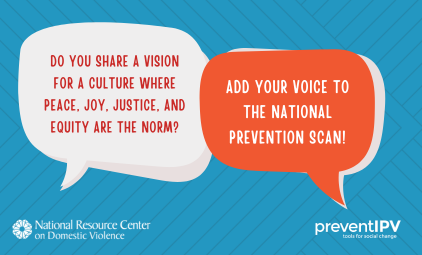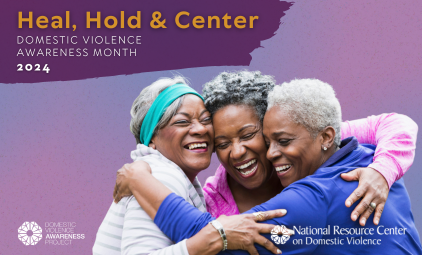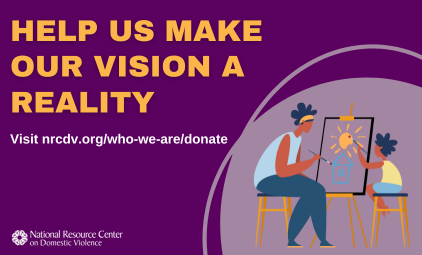Many domestic violence organizations are committed to integrating the voices and experiences of domestic violence survivors into their work. Hearing directly from survivors about their experiences and the impact of domestic violence on their lives, family, and community can inspire and energize others to act, as well as assist in reducing or removing barriers faced by survivors and their children.
When survivors express a desire or willingness to speak out about their experiences, victim advocates are in a unique position to provide support and help them weigh the risks and benefits of sharing their stories publicly. Below are a few critical points for consideration when supporting a survivor through the process of speaking about her/his story in public. These and other relevant points for advocates and survivors are explored in more detail in From the Front of the Room: An Advocates Guide to Help Prepare Survivors for Public Speaking and the accompanying Survivor’s Guide to Public Speaking by the NRCDV (September 2011).
…it is important to leave a legacy… of not being afraid to tell the truth… we must pass this on to our children rather than a legacy of fear and victimization.” ~ SONIA SANCHEZ, Black Women Writers at Work
Protecting the survivor’s confidentiality.
Strategize with the survivor speaker. For example, if the survivor speaker wishes to remain anonymous, plan the event without using the survivor’s name, the abuser’s or family name, photos or voice in printed materials or online. Use this as a teachable moment to explain why this is necessary and that for many victims, even after they have left an abusive relationship, their safety may still be at risk. Just as safety planning should be survivor-defined, so should public speaking engagements.
Providing support before the speaking event.
Advocates are experts in helping victims sort through their experiences as they prepare for court, or for other situations where they have to summarize the circumstances of their abuse. These same skills can be utilized in helping a victim/survivor sift through the  overwhelming amount of details as they prepare to tell their story publicly.
overwhelming amount of details as they prepare to tell their story publicly.
Discussing potential implications on family members of the sharing of her/his story.
Encourage the survivor speaker to talk with her children and other family members about the opportunity to share her story. The reaction of family members need not discourage a survivor speaker from telling her story, but may influence what is shared and the details that are included. You might also want to talk with the survivor about the potential impact of her story being heard by friends and/or co-workers. This might be a good time to discuss some possible scenarios with the survivor speaker in advance.
Providing support after the presentation.
Say “thank you.” It takes courage and resiliency for a survivor speaker to share their story publicly. Remember to be appreciative and offer affirmation of their efforts. It is also important to follow up with the survivor speaker after the presentation, both immediately after and a few days later, to process what the experience was like for them. Be prepared to make additional referrals as needed to someone other than advocates at your program in order for her to adequately process her feelings and reactions or to deal with any repercussions that are outside the scope of your services.
Preparing for media exposure.
It is important for a survivor speaker to know if media outlets will be there or have been invited and, if so, to consider the implications this represents for her. The physical and emotional safety concerns may be increased for the survivor due to the increased awareness of the abuse for the public, and potentially the abuser, that media coverage would generate. As an advocate, you may want to work through a survivor speaker’s remarks and safety plan more closely to anticipate any potential risks that media involvement may create.
Share your experiences with organizing public speaking engagements where survivors share their stories. What have you learned to be critical things to keep in mind in order to enhance the safety and effectiveness of the event?


















